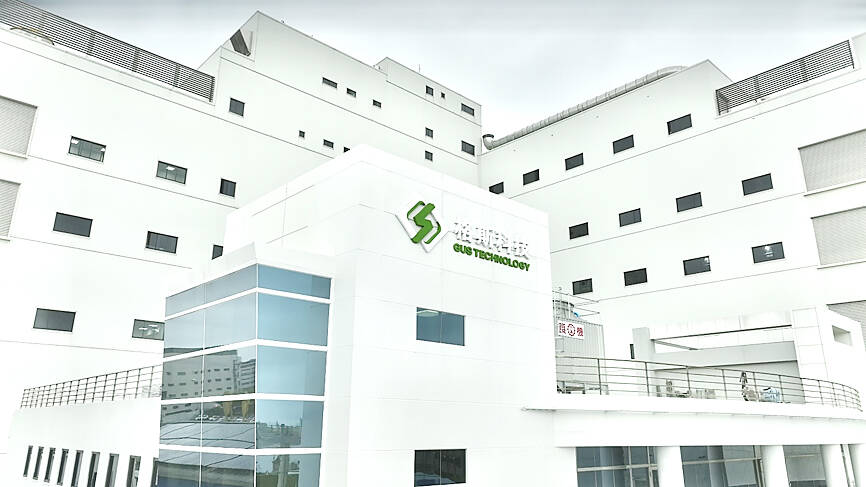Gus Technology Co (格斯科技), a lithium-titanate-oxide (LTO) battery cell and pack maker, on Wednesday launched its first large-scale battery factory and said it is in discussing with potential customers to quadruple its battery capacity to meet fast-growing demand.
The NT$4 billion (US$130.3 million) fab, in Taoyuan City’s Jhongli District (中壢), is to start operations in the third quarter, with an initial capacity of 250 megawatts per year.
The schedule is ahead of Gus Technology’s local competitors, including Taiwan Cement Corp (台泥), Formosa Group (台塑集團) subsidiary Formosa Smart Energy Tech Corp (台塑新智能科技) and Hon Hai Precision Industry Co (鴻海精密).

Photo courtesy of Gus Technology Co
The fab is expected to reach full capacity of 1 gigawatt per year by the second quarter of next year, the company said.
The company counts Japan’s Kaneka Corp, Toshiba Corp and InnoBat Auto of Slovakia, the European pioneering supplier of premium batteries for electric vehicles, as its major customers.
Once the fab is 100 percent utilized, it would produce 6 million high-end LTO battery packs per year, which would translate into an annual revenue of NT$6 billion to NT$9 billion, Gus chairman Chang Chung-chieh (張忠傑) said during the launch ceremony on Wednesday.
The company plans to produce battery cells used in high-end automated guided vehicles and home battery storage systems at the fab in the initial stage, Chang said. Next year, it will start shipping battery cells used in electric vehicles, given a longer qualification process with carmakers, he said. The company is also expanding its business scope to battery cells used in unmanned aircrafts, he said.
Gus also focuses on developing battery materials used in next-generation NCM batteries, which compose of lithium, nickel, cobalt and manganese.
Gus, an eight-year-old company based in New Taipei City’s Sijhih District (汐止), said new capacity expansions are being planned, as customers’ demand for its LTO battery packs would surge to more than 4 gigawatts within next three years, Chang told reporters.
Chang said the uptake of LTO battery soft packs are increasing, especially for cars, as such soft-pack batteries are 15 percent lighter than the traditionally hard square and cylindrical battery packs and can be used under extreme temperatures from minus Celsius 40 degrees to 60 degrees. Besides, its LTO soft-pack batteries made by Gus can be recharged and discharged 10,000 times.
Gus on Wednesday signed a memorandum of understanding (MOU) with its customer Midwest Energy Pvt of India to build a LTO battery pack in India, with most funding from the Indian company.
Other factories could be built with potential customers abroad, the company said.
The company also signed two MOUs with Echion Technologies of the UK and Beyonder of Norway to make LTO batteries on a contract basis.
Gus would also cooperate with its international partners in aspects such as battery cell anode materials, energy storage equipment and raw materials, it said.
LTO batteries charge faster than conventional lithium-ion batteries and are safer.

Taiwan’s long-term economic competitiveness will hinge not only on national champions like Taiwan Semiconductor Manufacturing Co. (TSMC, 台積電) but also on the widespread adoption of artificial intelligence (AI) and other emerging technologies, a US-based scholar has said. At a lecture in Taipei on Tuesday, Jeffrey Ding, assistant professor of political science at the George Washington University and author of "Technology and the Rise of Great Powers," argued that historical experience shows that general-purpose technologies (GPTs) — such as electricity, computers and now AI — shape long-term economic advantages through their diffusion across the broader economy. "What really matters is not who pioneers

In a high-security Shenzhen laboratory, Chinese scientists have built what Washington has spent years trying to prevent: a prototype of a machine capable of producing the cutting-edge semiconductor chips that power artificial intelligence (AI), smartphones and weapons central to Western military dominance, Reuters has learned. Completed early this year and undergoing testing, the prototype fills nearly an entire factory floor. It was built by a team of former engineers from Dutch semiconductor giant ASML who reverse-engineered the company’s extreme ultraviolet lithography (EUV) machines, according to two people with knowledge of the project. EUV machines sit at the heart of a technological Cold

TAIWAN VALUE CHAIN: Foxtron is to fully own Luxgen following the transaction and it plans to launch a new electric model, the Foxtron Bria, in Taiwan next year Yulon Motor Co (裕隆汽車) yesterday said that its board of directors approved the disposal of its electric vehicle (EV) unit, Luxgen Motor Co (納智捷汽車), to Foxtron Vehicle Technologies Co (鴻華先進) for NT$787.6 million (US$24.98 million). Foxtron, a half-half joint venture between Yulon affiliate Hua-Chuang Automobile Information Technical Center Co (華創車電) and Hon Hai Precision Industry Co (鴻海精密), expects to wrap up the deal in the first quarter of next year. Foxtron would fully own Luxgen following the transaction, including five car distributing companies, outlets and all employees. The deal is subject to the approval of the Fair Trade Commission, Foxtron said. “Foxtron will be

INFLATION CONSIDERATION: The BOJ governor said that it would ‘keep making appropriate decisions’ and would adjust depending on the economy and prices The Bank of Japan (BOJ) yesterday raised its benchmark interest rate to the highest in 30 years and said more increases are in the pipeline if conditions allow, in a sign of growing conviction that it can attain the stable inflation target it has pursued for more than a decade. Bank of Japan Governor Kazuo Ueda’s policy board increased the rate by 0.2 percentage points to 0.75 percent, in a unanimous decision, the bank said in a statement. The central bank cited the rising likelihood of its economic outlook being realized. The rate change was expected by all 50 economists surveyed by Bloomberg. The